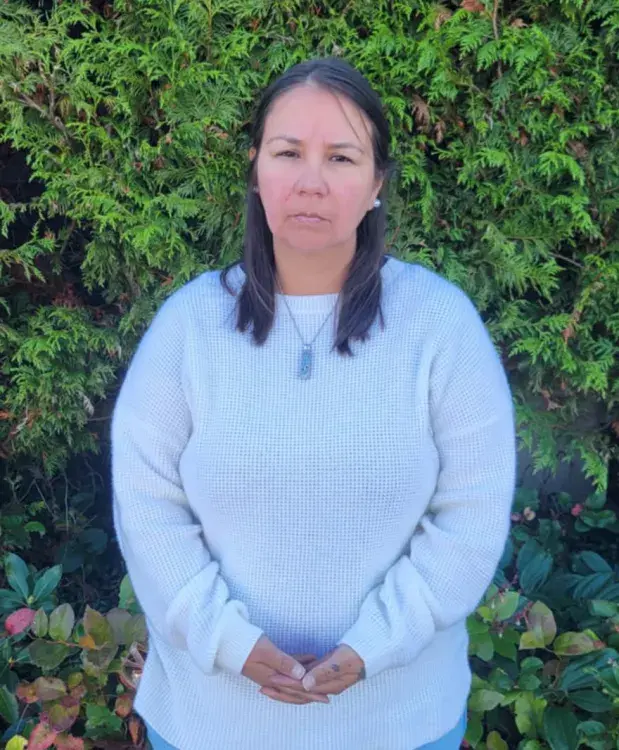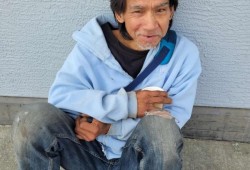A mother who recently lost her son in a car accident is calling for systemic changes, after being left in the dark about the deceased’s whereabouts for most of a week.
It took five days for Nancy Antoine to get any information from the BC Coroners Service. Her son Nick was killed in a collision by Cameron Lake on Sept. 27.
“I had to look for my son and look for his car. Stand by and wait,” she said in correspondence with Ha-Shilth-Sa. “It should not be like this for grieving families.”
“The frustration as a parent is waiting for the coroner or the police to get back to us on where he was taken, where his car was taken so we can see if anything was recoverable,” added Nancy. “No one called us. We had to seek this information out ourselves.”
Nick Antoine lost his life on a Saturday afternoon when, heading eastbound, his Honda Civic collided with another car on Highway 4.
“Speed and road conditions” were believed to be a factor, according to the Oceanside RCMP, adding that the other driver was sent to hospital with possible life-threatening injuries.
Nick Antoine was 20, a member of the Saik’uz First Nation, with ancestral ties to Ahousaht and Ditidaht. He was on his way to Sooke to play in a punk rock band he had recently joined.
“Nick was great young adult,” said his mother. “Didn't drink or do any substances. He was always the sober driver. We changed the intergeneration trauma, broke the cycle of alcoholism for Nick and his brother.”
Nancy has sent a letter to government agencies and politicians, calling for a review of the communication standards followed by the Coroners Service and the RCMP. Her letter stresses the need for “transparent communication practices that ensure families are provided with timely and complete information without having to seek it themselves.”
The lack of information delayed the young man’s funeral, leading the mother to call for the “implementation of clear, culturally respectful guidelines for handling deaths in Indigenous families, including funeral protocols.”
Nancy said that critical information about her son’s passing was withheld, which forced the family to seek out answers themselves.
Normally, the police are the first to notify next of kin about an unexpected death.
“Receiving a death notification can be an extremely stressful experience,” said Corp. Alex Bérubé of the RCMP Island District Media Relations. “Every death notification has a long-lasting impact on family members. How the notification of the death is provided can positively or negatively affect family members.”
Investigations into a death are a cooperative effort between the RCMP, a medical examiner, pathologist, coroner or other necessary agencies.
“Generally speaking, the RCMP will assist with next-of-kin notifications by providing family members with the details of when, where and how the death occurred,” explained Corp. Bérubé. “They will provide family members with the current location of the victim, and the process to make arrangements to see and/or recover the victim and advise family members of the medical examiner’s or coroner’s contact information.”
But this wasn’t Rhonda Charlie’s experience. In the summer of 2024 she was about to leave her home to volunteer at the Lakedown Shakedown concert, when two female police officers approached the door. They informed Charlie of the death of her younger brother.
“I fell apart. I was left dealing with something devastating...Steven’s funeral,” she said.
Steven Robert Johnson was found in his apartment at the Beaufort Convention Centre, a rough, low-rent building in Port Alberni’s uptown neighbourhood. Although Steven was identified by other tenants, his sister wasn’t notified until almost a weak after his death, according to an outreach worker who asked not to be identified.
Making matters worse, the family had no idea where Steven’s body was.
“I made numerous phone calls starting with Yates funeral home. They told me that they didn't have his body and to try the other funeral homes,” said Rhonda.
She called other funeral homes, only to get no information about the whereabouts of her brother’s body. With every call the situation became more devastating for Rhonda and her children.
“They loved him so much,” she said. “I couldn't locate him, my baby brother. I even called the hospital in Port to see if he was still there. He wasn't.
The search for his body continued for a week as questions about Steven persisted from other family members. Through the efforts of multiple outreach workers and agencies, the body was eventually located in Nanaimo. But this was too late for the open casket funeral that Rhonda had hoped for.
The BC Coroners Service investigates all “unnatural, sudden and unexpected, unexplained or unattended deaths”, according to the agency’s website. For each death, the coroner identifies the deceased and determines cause of death.
Family and the outreach worker believe that the cause of death was likely a drug overdose, but this was never confirmed amid the delayed messaging from the Coroners Service.
“I was told that because it took so long that his body was not viewable,” said Rhonda. “So no open casket for my baby brother. I did not get to see him one last time!”
The BC Coroners Service did not respond to questions by press time.


